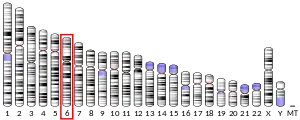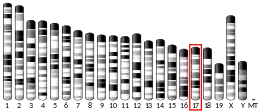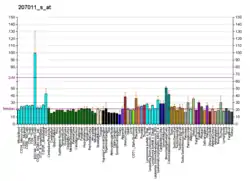Tyrosine-protein kinase-like 7 also known as colon carcinoma kinase 4 (CCK4) is a receptor tyrosine kinase that in humans is encoded by the PTK7 gene.[5][6]
Function
Receptor protein tyrosine kinases transduce extracellular signals across the cell membrane. A subgroup of these kinases lack detectable catalytic tyrosine kinase activity but retain roles in signal transduction. The protein encoded by this gene an intracellular domain with tyrosine kinase homology and may function as a cell adhesion molecule. This gene is thought to be expressed in colon carcinomas but not in normal colon, and therefore may be a marker for or may be involved in tumor progression. Four transcript variants encoding four different isoforms have been found for this gene.[6]
PTK7 serves as a context-dependent signalling switch for the Wnt pathways (particularly in planar cell polarity related functions such as convergent extension and neural crest cell migration) and appears to have similar functions for plexin and Flt-1 pathways.[7] PTK7 was identified to be highly expressed in colon cancer by Saha et al. using serial analysis of gene expression (LongSAGE).[8] Pfizer is targeting PTK7 for cancer by generating an antibody-drug conjugate against the PTK7 receptor.
References
- 1 2 3 GRCh38: Ensembl release 89: ENSG00000112655 - Ensembl, May 2017
- 1 2 3 GRCm38: Ensembl release 89: ENSMUSG00000023972 - Ensembl, May 2017
- ↑ "Human PubMed Reference:". National Center for Biotechnology Information, U.S. National Library of Medicine.
- ↑ "Mouse PubMed Reference:". National Center for Biotechnology Information, U.S. National Library of Medicine.
- ↑ Mossie K, Jallal B, Alves F, Sures I, Plowman GD, Ullrich A (Nov 1995). "Colon carcinoma kinase-4 defines a new subclass of the receptor tyrosine kinase family". Oncogene. 11 (10): 2179–84. PMID 7478540.
- 1 2 "Entrez Gene: PTK7 PTK7 protein tyrosine kinase 7".
- ↑ Peradziryi H, Tolwinski NS, Borchers A (Aug 2012). "The many roles of PTK7: a versatile regulator of cell-cell communication". Archives of Biochemistry and Biophysics. 524 (1): 71–6. doi:10.1016/j.abb.2011.12.019. PMID 22230326.
- ↑ Saha, S., et al. (2002). "Using the transcriptome to annotate the genome." Nat Biotechnol 20(5): 508-512.
Further reading
- Lee ST, Strunk KM, Spritz RA (Dec 1993). "A survey of protein tyrosine kinase mRNAs expressed in normal human melanocytes". Oncogene. 8 (12): 3403–10. PMID 8247543.
- Park SK, Lee HS, Lee ST (Feb 1996). "Characterization of the human full-length PTK7 cDNA encoding a receptor protein tyrosine kinase-like molecule closely related to chick KLG". Journal of Biochemistry. 119 (2): 235–9. doi:10.1093/oxfordjournals.jbchem.a021228. PMID 8882711.
- Banga SS, Ozer HL, Park SK, Lee ST (1997). "Assignment of PTK7 encoding a receptor protein tyrosine kinase-like molecule to human chromosome 6p21.1-->p12.2 by fluorescence in situ hybridization". Cytogenetics and Cell Genetics. 76 (1–2): 43–4. doi:10.1159/000134511. PMID 9154124.
- Jung JW, Ji AR, Lee J, Kim UJ, Lee ST (Dec 2002). "Organization of the human PTK7 gene encoding a receptor protein tyrosine kinase-like molecule and alternative splicing of its mRNA". Biochimica et Biophysica Acta (BBA) - Gene Structure and Expression. 1579 (2–3): 153–63. doi:10.1016/s0167-4781(02)00536-5. PMID 12427550.
- Zhang H, Li XJ, Martin DB, Aebersold R (Jun 2003). "Identification and quantification of N-linked glycoproteins using hydrazide chemistry, stable isotope labeling and mass spectrometry". Nature Biotechnology. 21 (6): 660–6. doi:10.1038/nbt827. PMID 12754519. S2CID 581283.
- Kobus FJ, Fleming KG (Feb 2005). "The GxxxG-containing transmembrane domain of the CCK4 oncogene does not encode preferential self-interactions". Biochemistry. 44 (5): 1464–70. doi:10.1021/bi048076l. PMID 15683231.
- Katoh M, Katoh M (Sep 2007). "Comparative integromics on non-canonical WNT or planar cell polarity signaling molecules: transcriptional mechanism of PTK7 in colorectal cancer and that of SEMA6A in undifferentiated ES cells". International Journal of Molecular Medicine. 20 (3): 405–9. doi:10.3892/ijmm.20.3.405. PMID 17671748.




